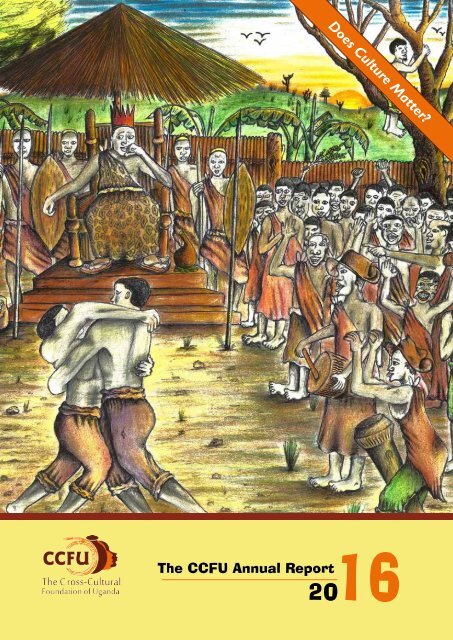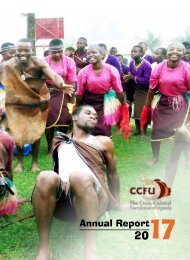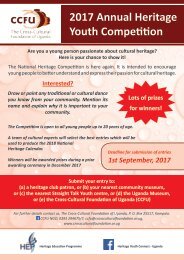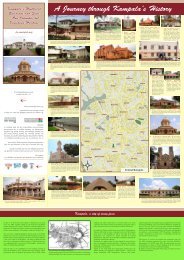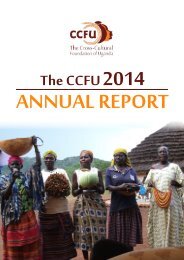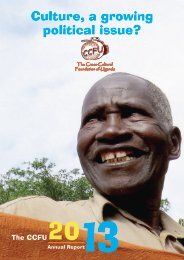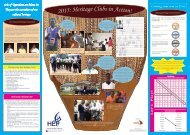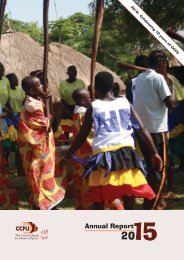CCFU Annual report 2016 Final
Does Culture Matter: Cultural affairs captured more media attention in 2016 than ever before. Does this reflect a growing acknowledgment by Ugandans that “culture matters”? A media review indicates a variety of developments in the culture sector in 2016.
Does Culture Matter: Cultural affairs captured more media attention in 2016 than ever before. Does this reflect a growing acknowledgment by Ugandans that “culture matters”? A media review indicates a variety of developments in the culture sector in 2016.
You also want an ePaper? Increase the reach of your titles
YUMPU automatically turns print PDFs into web optimized ePapers that Google loves.
Does Culture Matter?<br />
The <strong>CCFU</strong> <strong>Annual</strong> Report<br />
1
Illustration by Joshua Muyinza, 1st prize winner at the <strong>2016</strong> National Heritage Competition for Youth<br />
Welcome<br />
A word from our Chairperson 1<br />
Does Culture Matter? - The culture year in review 3<br />
Programme highlights 7<br />
The Six <strong>2016</strong> National Heritage Awards Winners 11<br />
Support us 12<br />
<strong>CCFU</strong> News 14<br />
In the coming year... 15<br />
Thank you 16
A Word from the Board<br />
Public discussions about the role of culture in development tend to generate (or degenerate into)<br />
contradictory arguments among Ugandans. On the one hand they tend to blame the ills of modernity<br />
on the erosion of traditional cultural values and norms. On the other hand, African culture(s) are<br />
castigated as generators and conveyors of structural and spiritual impediments to change, innovation<br />
and development in various fields.<br />
As the <strong>CCFU</strong> embarks on its second decade<br />
of organizational life it can proudly look back<br />
with intellectual humility on a steady record of<br />
injecting and sustaining the cultural paradigm<br />
as both a grassroots (community) and policy<br />
learning process of dialogue and action.<br />
As this publication bears out, <strong>CCFU</strong> far from<br />
being hamstrung by real or perceived ‘paradoxes’<br />
of the cultural approach, has instead engaged and<br />
urged development planners and practitioners to<br />
take a balanced view of these coexistent realities<br />
which run deep below the lived experiences and<br />
practices of the concerned communities.<br />
This brings to the fore the question of cultural<br />
ways of knowing as a basis for cross-cultural<br />
understanding and cross-valuation. But it also<br />
underlines the need for cultural activists to seek<br />
a more nuanced understanding of how and why<br />
culture is deployed by the various social-cultural<br />
forces within a community to propel particular<br />
values and norms: could it be for purposes of<br />
domination, survival, resistance, etc? In this<br />
regard, the issue of cultural rights should be<br />
grounded further in the context of the perennial<br />
land question. From <strong>CCFU</strong>’s perspective, this calls<br />
for more understanding and accommodation of<br />
communities who attach deep value to land as<br />
a cultural property and as a cultural-spiritual<br />
relation between land, forests, animals and people.<br />
The development vocabulary in Uganda is replete<br />
with abundant references to cross-cutting issues.<br />
That such issues have cultural dimensions or,<br />
indeed, that culture is a cross-cutter in its own<br />
right, seems not yet to carry sufficient sway<br />
in decision making circles of government to<br />
heed calls and pleas for a Ministry of Culture.<br />
Development that takes a fragmented instead of<br />
a focal approach to the cultural imperatives of<br />
its programmes risks impoverishing them all and<br />
ultimately courts failure. Thus, <strong>CCFU</strong> and all its<br />
partners will and should sustain the momentum<br />
behind the call for a Culture Ministry as a defining<br />
issue for the new decade.<br />
Luutu Mukasa<br />
Chairperson<br />
Associate Professor,<br />
University of South Africa,<br />
Marcus Garvey Institute<br />
1
2<br />
The culture year<br />
in review
Does culture matter?<br />
Cultural affairs captured more media attention last year than ever before. Does this reflect a<br />
growing acknowledgment by Ugandans that “culture matters”? This media review indicates a<br />
variety of developments in the culture sector in <strong>2016</strong>.<br />
Cultural leaders in prominence.<br />
For a start, Ugandans continued in <strong>2016</strong> to<br />
demonstrate their pride in their cultural identity<br />
and their allegiance to their cultural leaders.<br />
Throughout the year, these leaders expressed<br />
their concern to uphold cultural values for<br />
current and future generations. The kings of<br />
Buganda and Tooro along with Rwot Onen Acana<br />
II of Acholi for instance called upon communities<br />
to take pride in showcasing their diverse cultures<br />
and promoting cultural norms. The Bunyoro<br />
Kingdom advocated for the national recognition<br />
of Omukama Kabalega for his fierce resistance to<br />
British dominance and demanded the return of<br />
cultural items held in foreign museums.<br />
Cultural leaders in Bunyoro, Busoga and Buganda<br />
also encouraged the youth to embrace agriculture,<br />
recalling the value of indigenous varieties and<br />
the need to restore traditional granaries for<br />
food security in the face of changing climatic<br />
conditions. They also flagged their concerns<br />
about health through immunisation and other<br />
health campaigns. In Buganda and Tororo, they<br />
warned against harmful cultural practices such<br />
as ritual sacrifice. Their message was also one of<br />
peace. The King of Toro and the Obundigya Bwa<br />
Bamba castigated people who incite violence and<br />
tribal hatred.<br />
Land is an important cultural resource that<br />
informs people’s sense of identity, belonging<br />
and status. It can also be the source of conflicts,<br />
including between cultural institutions. This year,<br />
disputes arose between Buganda and Bunyala;<br />
Ma’di and Acholi; Bunyoro, Buganda and the<br />
National Forestry Authority. In Bunyoro, cultural<br />
leaders demanded laws on land acquisition<br />
prompted by the destruction of heritage sites<br />
and limited compensation to land owners<br />
and occupiers, following oil industry activities.<br />
Several cultural leaders opposed amendments to<br />
the Land Act proposing compulsory acquisition<br />
of land for national development projects,<br />
which they perceive as compromising ancestral<br />
property. Cultural leaders in the Ma’di sub-region<br />
rose up to protect Zoka forest against plunder<br />
(pictured above).<br />
It is therefore no surprise that, in the <strong>2016</strong><br />
presidential elections, chiefs and kings were<br />
perceived as influential power centres and were<br />
regularly drawn into party affairs (contrary to the<br />
law). Their allegiance to the State – which provides<br />
a stipend to many of them – also emerged as a<br />
contentious issue. In several instances, even the<br />
leadership of cultural institutions was contested.<br />
As the year came to a close, conflicts again<br />
erupted in the Rwenzori region, eventually<br />
leading to the incarceration of prominent leaders<br />
3
of the Rwenzururu Kingdom, including Omusinga<br />
Charles Mumbere. Some members of the public<br />
called for a review of the Traditional and Cultural<br />
Leaders’ Act to mitigate conflicts caused by gaps<br />
in the current law, especially where potentially<br />
competing cultural institutions are active in the<br />
same geo-cultural space.<br />
Cultural markers, symbols of our<br />
history and identity.<br />
Tangible and intangible culture can be identified,<br />
represented and safeguarded in many different<br />
ways. Buildings and sites represent human<br />
intellect and creativity, the history of a people,<br />
the identity of a place, the social order of a<br />
community and its respect for nature. This year,<br />
the Mayor of Jinja and the Busoga kingdom halted<br />
the demolition of the Ripon Falls Hotel for its<br />
historical significance – as one of the country’s<br />
first hotels and the place where Queen Elizabeth<br />
II shared a meal with Kyabazinga Nadiope on her<br />
1954 visit to Uganda. In Masaka, Our Lady of the<br />
Rosary Narozali Catholic Church, still standing<br />
after 115 years, marks the first years of the White<br />
Fathers in the country, and efforts to maintain<br />
the 2000-seater structure are taking into account<br />
its original architectural workmanship. Similar<br />
efforts with the Bugomba-Mapera Catholic<br />
Church in Kalangala are underway.<br />
Such initiatives are not always emulated. In the<br />
Tooro Kingdom, a controversial proposal to<br />
turn the Council Chambers into a hotel was<br />
eventually agreed upon. Plans by Government to<br />
construct two 20-storied buildings in the parking<br />
lot of the Uganda National Cultural Centre<br />
(pictured above) sparked spirited reactions from<br />
artists and the general public, who demanded<br />
that the integrity of Uganda’s only National<br />
Theatre be protected. Across the country, the<br />
remarkable efforts of individuals and institutions<br />
to preserve these symbols of our history and<br />
culture demonstrate that culture matters!<br />
Mother tongue, the foundation for<br />
understanding and learning.<br />
The merits and demerits of the thematic<br />
curriculum have gripped educationalists since it<br />
was introduced ten years ago. Claims that learning<br />
in one’s mother tongue enhances retention of<br />
knowledge, confidence, improves learner-parent<br />
relations, and enhances guardians’ appreciation<br />
of education have encouraged advocates of<br />
the thematic curriculum and have even led to<br />
suggestions to include it in the nursery school<br />
curriculum. The Kabaka of Buganda has urged<br />
teachers and school proprietors to teach Luganda<br />
to cement the kingdom’s culture and norms.<br />
Ekisaakate, a cultural heritage education initiative<br />
established by the Queen of Buganda marked 10<br />
years, while in Buruuli, the cultural institution<br />
supported the development of Ruruuli language<br />
school books. During the election period,<br />
councillors across the country struggled to swear<br />
their oaths in English and Mukono Town Council<br />
resolved to conduct meetings in Luganda. Some<br />
argued that the death of our languages will result<br />
in the demise of oral traditions and expressions<br />
- the mainstay of many of our cultures.<br />
Some parents across the country have however<br />
expressed the fear that their children will be<br />
disadvantaged because they are not able to speak<br />
and write in English at an early age. This, coupled<br />
with limited resources, and inadequate teacher<br />
competence and willingness, has resulted in only<br />
half the schools in the country taking up the<br />
thematic curriculum, according to the Ministry<br />
of Education.<br />
Showcasing our oral traditions.<br />
Oral traditions define Uganda’s diverse cultures<br />
but this valuable knowledge needs to be captured<br />
and passed on to the next generations in a medium<br />
that will stand the test of time. In <strong>2016</strong>, we were<br />
reminded of this wealth. Kabann Kabananukye<br />
captured the knowledge of elders in his book<br />
on “Clans and Totems of the Banyakigezi.” Sr<br />
Dominic Dipio captured a Ma’di custom in a film<br />
“Rainmaking: a Disappearing Practice”. This is still<br />
4
alive amongst the Iteso in Amuria district, who<br />
performed it – and received a downpour!<br />
Uganda’s submission for the urgent safeguarding<br />
of its sixth element, the Ma’di Bowl Lyre music<br />
and dance (O’di) was approved under the 2003<br />
UNESCO Convention for the Safeguarding of<br />
the Intangible Cultural Heritage. The Bayimba<br />
Cultural Foundation held the ninth edition of<br />
its International Festival of Arts which brought<br />
together renowned artistes and showed African<br />
absenteeism and early marriages that sometimes<br />
result from this practice.<br />
Elsewhere, <strong>report</strong>s on female genital mutilation<br />
by communities from Kween and Bukwo<br />
illustrated the resilience of cultural beliefs and<br />
customs. Despite being illegal in Uganda and<br />
despite spirited denouncement by civil society<br />
actors, the practice continues, often across the<br />
border. As the Sabiny demonstrate that their<br />
culture matters, there is a need to understand<br />
their cultural logic and to employ appreciative<br />
inquiry, which may yield better results than the<br />
forceful application of the law.<br />
The right to access, express and enjoy one’s<br />
culture is often taken for granted until one is<br />
deprived of it, as illustrated by Ankole loyalists<br />
who continued to demand the restoration of<br />
their kingdom, abolished in 1967.The Benet who<br />
were evicted from the forests of Mt Elgon; and<br />
Batwa communities who were expelled from<br />
Bwindi and Semuliki forests (pictured), demanded<br />
films. The National Museum co-organised a<br />
colourful national cultural exhibition which<br />
attracted a diversity of actors from across the<br />
country, and Uganda displayed this diversity<br />
at international exhibitions in Italy and in the<br />
United States.<br />
Exercising cultural rights.<br />
<strong>2016</strong> was the year of the Imbalu, the customary<br />
circumcision rites performed by the Bamasaba.<br />
The traditional drums were heard in all corners<br />
of the country and demonstrated the importance<br />
of this cultural right. Rights must however be<br />
accompanied by responsibility and the public<br />
raised concern about the promiscuity, school<br />
land and access to their cultural resources. They<br />
are also deprived of adequate education and<br />
other services - marginalised because of their<br />
cultural identity and small numbers.<br />
Various actors attempted to bring this<br />
situation to the attention of policy makers and<br />
implementers. It is anticipated that the first<br />
Member of Parliament from the ethnic minority<br />
Ik community will add his voice to alert the public<br />
about the concerns of indigenous minorities.<br />
Traditional ancestral beliefs are rarely a proudly<br />
exhibited public affair. Yet, people of all walks of life<br />
will exercise their cultural right and visit shrines<br />
for worship and thanksgiving. Today, shrines are<br />
however dubbed hubs of witchcraft, and riddled<br />
5
with stories of con artists and human rights<br />
abuses, resulting in endless controversy. A recent<br />
<strong>report</strong> notes that Ugandans have a tendency to<br />
switch religions more than any other people in<br />
Africa – could this possibly mean that, in spite<br />
of ‘modernity’ and religious conversion, culture<br />
indeed still matters?<br />
In conclusion…<br />
<strong>2016</strong> amply demonstrates that yes,<br />
culture matters. It matters because<br />
it provides a sense of belonging and<br />
collective memory which many will<br />
fight to protect. It informs our ability<br />
to learn and to express meaning –<br />
ultimately manifested in our actions. It<br />
matters because it motivates people<br />
to mobilise around issues that they<br />
believe are important for their lives<br />
and that of future generations. And it matters<br />
because it triggers a sense of responsibility for<br />
the less privileged in society. Culture is thus<br />
about power and sharing resources, and hence<br />
assumes an important political and development<br />
dimension.<br />
Yet, if culture mattered so much in <strong>2016</strong>, why is<br />
Uganda the only East African country without a<br />
Ministry of Culture? Why is the national budget<br />
allocation to culture well below 1%? Why is<br />
valuable tangible and intangible cultural heritage<br />
safeguarded<br />
from without<br />
rather than<br />
from within?<br />
Why do<br />
Ugandans<br />
have to study<br />
anthropology,<br />
heritage or<br />
m u s e u m<br />
studies in universities outside the country? These<br />
are questions <strong>CCFU</strong> will address itself in the<br />
course of the coming year.<br />
6
Programme<br />
Highlights<br />
7
1. Where is culture? – the ‘Culture in Development’<br />
approach<br />
It is increasingly recognised that development<br />
outcomes will only be truly sustainable on the<br />
African continent if they are in tune with the<br />
cultural identity and ambitions of its peoples.<br />
<strong>CCFU</strong> has worked since its inception to promote a<br />
positive understanding of culture in development,<br />
recognising culture as a vital ingredient of<br />
effective and equitable change. Yet, what does<br />
culture look like? Where does one look for this<br />
valuable resource? How can it be integrated in<br />
one’s development practice? At <strong>CCFU</strong>, suggesting<br />
answers to these questions have continued to<br />
inform our research and training work in <strong>2016</strong>.<br />
The new “Culture in Development”<br />
guide<br />
<strong>CCFU</strong> completed a new and expanded edition of<br />
its “Introducing Culture in Development” guide,<br />
based on experiences in Uganda, Kenya and<br />
Zimbabwe, and prepared for trainers and handson<br />
development practitioners.<br />
The guide includes a series of methods and<br />
tools, among others, to map cultural heritage,<br />
understand culture in the organisation, work with<br />
women as transmitters of cultural knowledge,<br />
make use of cultural practices for positive change,<br />
and to deal with cultural controversies.<br />
To publicise this guide and to promote the<br />
approach, <strong>CCFU</strong> organised an event in early<br />
<strong>2016</strong> to hear development practitioners who<br />
have used it to share their experiences. The event<br />
brought together participants from development<br />
organisations, government institutions, cultural<br />
institutions, the media and academia.<br />
Interested in joining<br />
our next “Culture in<br />
Development” course?<br />
This will take place in April 2017<br />
in the vicinity of Kampala. At the<br />
end of the training, you will be<br />
able to:<br />
• Deepen your appreciation of<br />
culture<br />
• Identify points for cultural<br />
interventions<br />
• Use a range of practical filed<br />
tools to analyse culture<br />
• Have an opportunity to<br />
appreciate and respond to the<br />
cultural context<br />
• Integrate culture in your<br />
development programmes.<br />
Contact us!<br />
8
2. Cultural rights are also human rights!<br />
Few Ugandans are conversant with cultural<br />
rights, although these are as important as any<br />
others and they are provided for under national<br />
and international law. Cultural rights concern<br />
language, cultural and artistic production,<br />
participation in cultural life, cultural heritage,<br />
intellectual property rights, and minorities’<br />
expression of their culture.<br />
Given this limited awareness, <strong>CCFU</strong> developed<br />
a booklet on “Understanding Cultural Rights”<br />
(to be published in 2017) and ran a training<br />
event to introduce cultural rights to human<br />
rights organisations and relevant government<br />
agencies, and to discuss how these organisations<br />
can incorporate cultural rights in their agenda.<br />
<strong>CCFU</strong> also contributed to the section on<br />
cultural rights in the national periodic <strong>report</strong> that<br />
was submitted to the UN Council on Human<br />
Rights. Among the recommendations made<br />
to government was the need to mainstream<br />
cultural rights in all programmes implemented<br />
by government institutions, highlighting culture<br />
as a foundation for social cohesion, employment<br />
and nation building. This <strong>report</strong> was used to peer<br />
review the status of rights compliance in Uganda,<br />
in Geneva in November <strong>2016</strong>.<br />
<strong>CCFU</strong> continued working with different<br />
stakeholders to promote the cultural rights<br />
of Uganda’s indigenous minority groups. A<br />
national coalition of like-minded organisations<br />
was formed. Efforts to document<br />
the life and history of a small<br />
Batwa community in Semuliki<br />
started. The Ik, Thur and Babwisi,<br />
Bavonoma and Bamba continued<br />
their partnership with <strong>CCFU</strong> to<br />
protect their heritage. An advocacy<br />
platform was also established with<br />
5 minority groups in Northern<br />
Karamoja: the Ngikutio, Ik, Napore,<br />
Mening and Nyangia.<br />
for possible sources of redress. In <strong>2016</strong>, <strong>CCFU</strong><br />
started research to explore the possibility of<br />
using the “culturally defined rights” of women<br />
in Acholi to promote their empowerment.<br />
<strong>CCFU</strong> also embarked on supporting youth and<br />
women groups (Go Culture Africa, Rwebisengo<br />
Widows’ Cultural Association) to better utilise<br />
their cultural heritage as business opportunities.<br />
This is expected to continue through 2017 and<br />
to grow with time.<br />
Cultural leaders influence community governance<br />
and act as gatekeepers of our heritage. <strong>CCFU</strong> has<br />
continued to work with them and in <strong>2016</strong> support<br />
was extended to the 3 cultural institutions in<br />
Bunyoro, Acholi and Alur to develop guidelines<br />
to inform the engagement of oil extracting<br />
companies with them. These guidelines will be<br />
completed and published in 2017.<br />
Support was also extended to the people of<br />
Ma’di, Rakai and Kibaale to preserve and promote<br />
their heritage. In Rakai, an Ordinance to protect<br />
the Namagoma urban forest was developed<br />
and is awaiting District assent. Heritage sites<br />
in Rakai were publicised on television to<br />
encourage cultural tourism. The Kibaale Heritage<br />
Development Project received support to<br />
document sites of cultural importance in the<br />
district. The Ma’di community museum was also<br />
supported and awaits your visit!<br />
Culture has often been blamed<br />
for the violation of women’s and<br />
young people’s human rights. Little<br />
effort is made to examine culture<br />
9
3. Promoting cultural heritage<br />
With the threats facing our heritage, it is<br />
imperative to change public perceptions on its<br />
usefulness and to help young people become<br />
proud of their cultural heritage and aware of<br />
their role in its preservation.<br />
Cultural heritage education clubs are now in<br />
existence in over 100 secondary schools. Six<br />
years of the heritage education programme<br />
have created a ripple effect with more schools<br />
requesting to join. The support from community<br />
museums and patrons has continued to<br />
contribute to vibrant clubs. As has become the<br />
custom, the annual heritage awarding ceremony<br />
for youth was held, unveiling the heritage<br />
calendar with illustrations on traditional games<br />
and sports by the competition winners (out of<br />
the 260 entries received). The cover page of this<br />
annual <strong>report</strong> depicts one these winning entries.<br />
Reflecting the importance of our built heritage<br />
as landmarks of Uganda’s history, the Foundation<br />
has continued its activities to protect and<br />
promote the heritage of Kampala. Following last<br />
year’s production of a map of Kampala’s historic<br />
buildings and sites, <strong>CCFU</strong> trained owners and<br />
managers of selected buildings and tour guides to<br />
manage and promote their properties as tourism<br />
centres and started developing information<br />
materials on three such sites, the Ham Mukasa<br />
residence in Rubaga, the St. Catherine ward<br />
at Mengo Hospital and Makerere University.<br />
Ultimately, the protection of our built heritage<br />
will depend on an effective legal framework<br />
and <strong>CCFU</strong> initiated discussion in <strong>2016</strong> with the<br />
Kampala Capital City Authority to enact a byelaw<br />
to that effect.<br />
<strong>CCFU</strong> continued to network internationally in<br />
<strong>2016</strong>: we took part, in our capacity as vice-chair<br />
of the International National Trusts Organisation,<br />
in meetings of the organisation. The Foundation<br />
also continued to work with UNESCO in the<br />
framework of the 2003 Convention for the<br />
Safeguarding of the Intangible Cultural Heritage:<br />
we attended the 11th Inter-Governmental<br />
Meeting held in Ethiopia as an accredited NGO<br />
and made presentations to delegates on our<br />
work at the ICH NGO Forum.<br />
Villa Necchi Campiglio: INTO Executive Committee members visit FAI property, Milan, Italy<br />
10
The Six <strong>2016</strong> National Heritage Awards Winners<br />
A few exemplary individuals, families and<br />
organisations have taken the initiative to preserve<br />
elements of our built and of our intangible<br />
heritage. The significance of their efforts is rarely<br />
recognised and <strong>CCFU</strong> was therefore especially<br />
pleased to organise the Second National<br />
Heritage Award ceremony in <strong>2016</strong>. With the<br />
help of a jury, three awardees were recognised<br />
for their contribution to the development of our<br />
intangible cultural heritage and three for their<br />
work to protect our built or natural heritage<br />
Intangible Heritage:<br />
Dr. Albert Ssempeke (RIP) and family for its<br />
contribution to preserving the musical<br />
heritage of Buganda<br />
Tangible Heritage:<br />
Richard Atya Cwinyaai for leading the Nebbi<br />
Cultural Troupe into an effective advocate of<br />
positive cultural values<br />
The Ndote family for turning the manufacture<br />
of traditional musical instruments into a viable<br />
business enterprise<br />
St Peter’s School in Nsambya for carefully conserving their ‘Fort Jesus’ building (1895-1907)<br />
The Madhvani family and group of companies for restoring and effectively<br />
making use of their first building (1922) in Jinja<br />
Dr. Yahaya Sekagya and PROMETRA for preserving Buyijja forest and<br />
using it to promote our traditional knowledge of medicinal plants<br />
11
Support our campaigns to promote heritage!<br />
All youth must have access to their<br />
culture<br />
With the breakdown of family values, and with<br />
limited formal spaces to learn about heritage,<br />
the youth - who are the future custodians of our<br />
heritage - are rarely supported to appreciate the<br />
positive aspects of culture.<br />
To address this important but neglected aspect<br />
of our social development, heritage education<br />
should be fully integrated in the upcoming<br />
national curriculum for secondary schools in<br />
Uganda. Government should retain the use of<br />
local languages as a medium of instruction in<br />
lower primary schools. It should invest in building<br />
the capacity of school teachers to educate the<br />
youth about cultural heritage and it should ensure<br />
that the National Council for Higher Education<br />
supports tertiary institutions to develop courses<br />
on heritage studies, intangible cultural heritage<br />
and related disciplines<br />
All Ugandans are entitled to their<br />
cultural rights<br />
Cultural rights concern many of the aspects of<br />
life that we treasure and that merit protection.<br />
States must refrain from interfering with the<br />
enjoyment of these rights by everyone, without<br />
discrimination; while taking measures that lead to<br />
their fulfilment by all.<br />
Help us make Heritage Education a<br />
reality for all youth in Uganda!<br />
The rights of indigenous people need better<br />
protection. Ethnic minorities include the more<br />
than 1 million fellow Ugandans, who are often<br />
stereotyped by their neighbours and known by<br />
derogative names. Their political representation<br />
is still limited and, in several cases, their language<br />
is disappearing and their access to cultural sites<br />
(such as within national parks) is restricted.<br />
Further, they are often at risk of seeing<br />
their culture assimilated by more numerous<br />
neighbouring groups. We call on Government<br />
to ensure that the cultural rights of indigenous<br />
minorities are respected.<br />
Support the national coalition for<br />
Indigenous Minorities’ Rights!<br />
12
Our built heritage must be saved<br />
The historical and cultural fabric of a country<br />
is essential to its well-being and identity. A city’s<br />
history is appreciated, by the quality of life<br />
and cannot be provided by uniform glass and<br />
concrete towers that attract traffic jams and<br />
pollution. Cultural distinctiveness also generates<br />
income through tourism. Municipal authorities,<br />
including Kampala, therefore have a duty to<br />
preserve the historical value of their cities for<br />
the benefit of present and future generations. Yet<br />
Uganda needs a Ministry of Culture<br />
The Government established a Ministry of<br />
Culture and Community Development soon<br />
after independence, and this spearheaded many<br />
actions that strengthened the cultural sector, such<br />
as with the world-famous Heartbeat of Africa<br />
troupe (see photo). In the 1990s however, the<br />
culture function was split within two ministries<br />
and relegated to the status of departments (now<br />
“Culture and Family Affairs” in the Ministry of<br />
Gender, Labour and Social Development, and<br />
“Museums and Monuments” in the Ministry of<br />
Tourism, Wildlife and Antiquities).The lack of a<br />
substantial Ministry in charge of culture conveys<br />
The Apollo Kaggwa family residence in Manyangwa, near Kampala<br />
our built heritage is fast vanishing. The Uganda<br />
Government has developed a Museums and<br />
Monuments Policy that facilitates this task and has<br />
ratified international legal instruments, including<br />
UNESCO Conventions, that oblige it to safeguard<br />
important elements of the country’s tangible and<br />
intangible heritage.<br />
Get involved! Support our efforts to save<br />
the remnants of our historical heritage!<br />
a powerful message of lack of interest in Uganda’s<br />
culture and its role in nation-building. Financial<br />
resources remain critically low (0.01% of the<br />
National Budget in 2015/16).<br />
We call upon Government to re-establish a<br />
fully-fledged Ministry of Culture to recognise<br />
the central role of culture in defining Ugandan<br />
identity; to affirm our sovereignty; to meet our<br />
constitutional provisions; to provide support<br />
to key national projects; and to enhance<br />
development through culture. Uganda is the only<br />
State in the wider East African region without<br />
a Ministry of Culture. Cultural leaders in their<br />
recent Strategic Statement have unanimously<br />
called for its re-instatement.<br />
The Time is Now for a Ministry of<br />
Culture in Uganda! Sign our on-line<br />
petition!<br />
13
<strong>CCFU</strong> News<br />
Board of Trustees<br />
<strong>2016</strong> was a year of mixed fortunes for our Board<br />
of Trustees. A towering source of inspiration and<br />
energy, Moses Wafula Mapesa, the Chairperson<br />
of <strong>CCFU</strong>’s Board of Trustees, passed away at the<br />
beginning of the year. He will be remembered<br />
for being passionate about conservation and<br />
cultural heritage preservation. He held a strong<br />
conviction of the relevance of <strong>CCFU</strong>’s mission in<br />
the current development context. During his term<br />
of service with the Uganda Wildlife Authority,<br />
he opened its doors to reflect on and develop<br />
culturally sensitive approaches to community<br />
engagement, recognising the link between culture<br />
and conservation. Moses’ time with <strong>CCFU</strong> was<br />
short but effective.<br />
We were privileged this year to welcome two<br />
new members on our Board.Thomas Okoth<br />
Nyalulu is Senior Advisor at the Tieng Adhola<br />
Cultural Institution. Thomas is well versed with<br />
cultural affairs and the operations of cultural<br />
institutions in Uganda. He brings to <strong>CCFU</strong> a valued<br />
understanding of the cultural context and history<br />
of Uganda, good public relations with cultural<br />
institutions and passion for the promotion of<br />
progressive culture. Regina<br />
Bafaki is the Executive Director<br />
of Action for Development<br />
(ACFODE). Regina has a<br />
wealth of experience and<br />
passion for gender equity. She<br />
brings to <strong>CCFU</strong> expertise in<br />
organisational development<br />
and management and good<br />
public relations.<br />
Secretariat<br />
Mutambi has been appointed <strong>CCFU</strong>’s Deputy<br />
Director. Barbra comes with many years of<br />
experience in development practice, ranging<br />
from project planning and management, advocacy,<br />
gender programming, human rights protection<br />
and promotion, monitoring and evaluation,<br />
mediation and child protection. Barbara is<br />
passionate about culture and driven to investigate<br />
its relevance to contemporary development<br />
issues. She is responsible for overseeing <strong>CCFU</strong>’s<br />
programme and policy implementation. We also<br />
welcomed David Rupiny as a volunteer to work<br />
on our heritage initiatives, especially our budding<br />
Heritage Trust Project, and Prince Ibrah Kitaulwa<br />
as the coordinator for the Ugandan Community<br />
Museums’ Association.<br />
Marking 10 years of existence<br />
We were delighted in <strong>2016</strong> to mark 10 years<br />
of existence and to see so many of our friends<br />
and partners come and celebrate with us at<br />
an engaging event held at the Nommo Gallery<br />
grounds in Kampala in June. It was an occasion<br />
to reflect on our story so far, and to position<br />
ourselves to meet the challenges ahead.<br />
With its growing activities,<br />
<strong>CCFU</strong> was happy in <strong>2016</strong> to<br />
welcome additions to its staff<br />
team. Barbra Babweteera<br />
14
In the coming year…<br />
We anticipate several new initiatives to further<br />
achieve our mission in 2017:<br />
After the initial research on the relevance of<br />
culturally defined rights for women and girls in<br />
the Acholi region, the Foundation will engage,<br />
women and girls, cultural leaders, development<br />
actors and the media on ways in which cultural<br />
values and practices can be used to better defend<br />
the rights of women and girls.<br />
Our work to support ethnic minorities realise<br />
their cultural rights will continue and incorporate.<br />
new activities. Regional platforms for indigenous<br />
minority groups in Northern Karamoja and the<br />
Rwenzori region will be supported. <strong>CCFU</strong> will<br />
also play its part in an emerging national NGO<br />
coalition working on issues related to indigenous<br />
minority groups. Our cooperation with the<br />
districts of Rakai, Kibaale and in the Mad’i subregion<br />
will focus on the sustainability of their<br />
initiatives.<br />
Work to document the oral history of the Batwa<br />
community in Bundibugyo will be finalised and<br />
a similar undertaking will be initiated with the<br />
Lendu community in West Nile. We expect our<br />
cultural entrepreneurship project for women and<br />
youth to support additional groups.<br />
Cooperation with cultural institutions should<br />
see the guidelines on oil and gas exploration<br />
issued by Ker Kwaro Acholi and the kingdoms of<br />
Bunyoro and Alur published, with local language<br />
versions. These will be disseminated through a<br />
public event and the media to improve on the<br />
relationship between cultural institutions and oil<br />
companies.<br />
<strong>CCFU</strong> anticipates that initial steps will be taken in<br />
2017 to restore and protect a historical building<br />
in the vicinity of Kampala, through the Uganda<br />
Heritage Trust Project.<br />
Funds permitting, <strong>CCFU</strong> will also embark on two<br />
new initiatives. One will examine the link between<br />
the indigenous knowledge of local communities<br />
and the conservation of great apes in Western<br />
Uganda. The second will support heritage studies,<br />
with a focus on intangible cultural heritage in<br />
selected universities.<br />
15
Thank you!<br />
None of the activities described in the previous pages would have been possible<br />
without the active and generous support from our many friends, partners and<br />
funders in Uganda and beyond.<br />
We thank all of them, our Board of Trustees, the programme partners spread all<br />
over the country, the funders both national and international, service providers,<br />
line Ministries, Departments and Agencies in the Uganda government, the<br />
schools on the Heritage Education Programme and other local partners, and<br />
each of you in your individual capacities.<br />
In <strong>2016</strong>, <strong>CCFU</strong> received financial support amounting to UGS 664 million, thus<br />
meeting our planned income for the year. We thank our funders for believing in<br />
us, and for supporting our cause:<br />
• Action Aid Uganda<br />
• Arcus Foundation<br />
• Bread for the World – Protestant Development Service<br />
• Diakonia<br />
• Irish Aid<br />
• International National Trusts Organisation (INTO)<br />
• Plan International Uganda<br />
• Plan International Zimbabwe<br />
• Uganda National Commission for UNESCO<br />
• UNESCO Intangible Cultural Heritage Section, Paris<br />
And above all, to God Almighty who gave us yet another opportunity to live and<br />
serve our communities.<br />
To all who are interested, our financial statements are available on request.<br />
16
17
18<br />
Off Bativa Rd, Makerere,<br />
P.O. Box 25517, Kampala, Uganda<br />
Tel. +256 (0) 393294675/7<br />
ccfu@crossculturalfoundation.or.ug<br />
www.crossculturalfoundation.or.ug<br />
<strong>CCFU</strong> NGO<br />
<strong>CCFU</strong>_NGO


